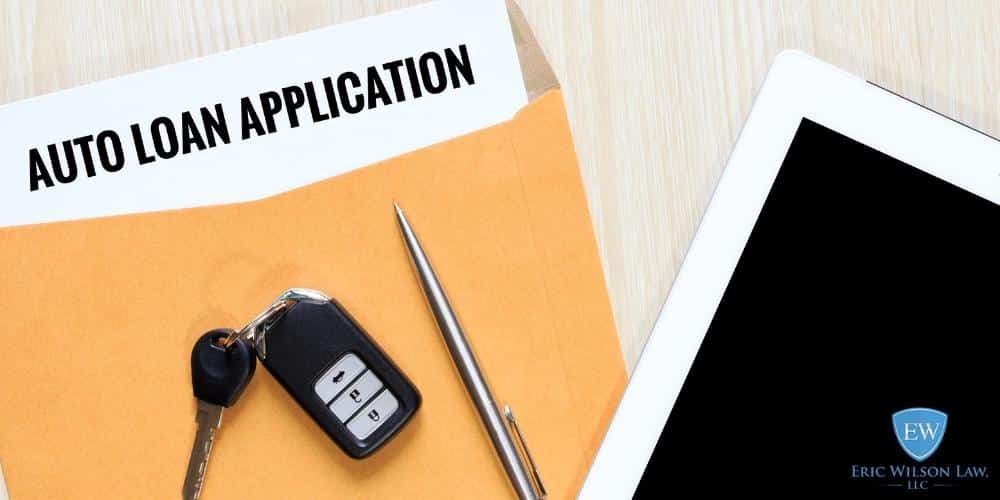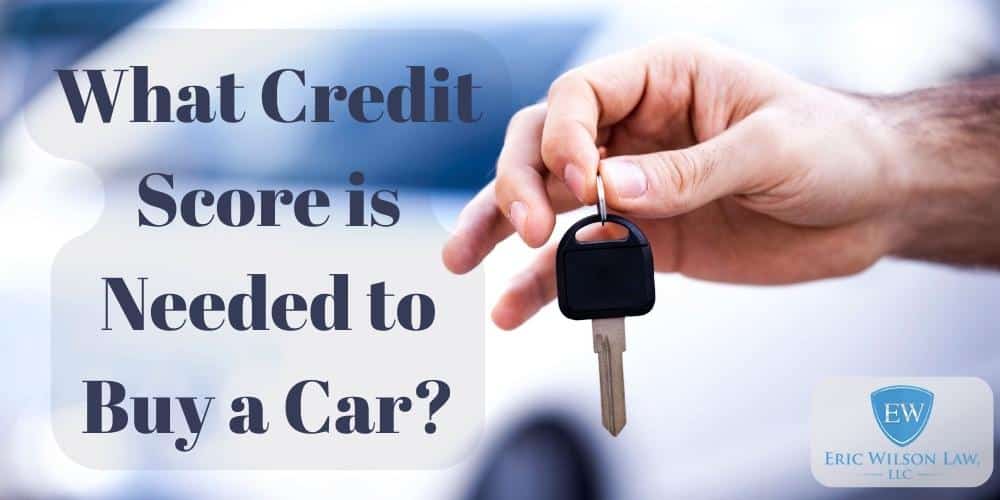Buying a car is a big decision to make. Reliable transportation can expand your education and employment opportunities. Transportation can also give you the freedom you need to pursue the life you want to live. The average cost of a vehicle at the end of 2021 was over $47,000. Used cars cost an average of just over $28,200. Very few people have this amount of cash on hand, so most people use an auto loan to pay for vehicles. Lenders use credit scores to determine the likelihood of getting their money back. Higher credit scores often mean a better outcome, but other factors play a big part in getting an auto loan. Down payment, length of monthly payments, interest rate, and which credit score auto lenders use can all go into this complicated process.
Credit scores can determine many of the large purchases in your life, including buying a home, buying a car, and even renting an apartment. Poor credit scores can indicate to lenders that you are a risk. Fortunately, there are ways to increase your credit score, and the legal team at Eric Wilson Law can help. For more information about the services we offer, call us today at 205-349-1280.
Auto Loans and Credit Scores
Credit scores and credit reporting can be complicated to understand. The three major credit bureaus (Equifax, Experian, and TransUnion) all report FICO scores. Your credit score can be different from all three credit reporting agencies. Depending on the credit model used, your score can vary widely with lenders. Read on below for the two most common scores, FICO and FICO Auto.

FICO Score
Your FICO credit score plays an important role in most major purchases. Your FICO score determines how big a risk you are to different lenders. Different aspects of your credit history can carry different weights to different lenders. Payment history plays the biggest role in your credit score at a whopping 35%. Available credit accounts for 30% of the score, and the age of your credit history makes up 15% of your credit score. Credit mix and new credit applications both account for 10%. Different lenders may see different aspects of your credit and come to different conclusions. Your base FICO score can give you an idea of your credit score, but most lenders use the FICO Auto Score model.
FICO Auto Score
Your FICO Auto Score is calculated a little differently than your base FICO score. The FICO Auto Score will put more weight on auto loans in your credit report. Depending on the person, this can mean a FICO Auto Score that’s higher or lower than their base score. Even lenders can weigh different aspects of your score differently. If you’ve been without an auto loan for a few years, one lender may feel neutral about this and another may see it as a risk.
How Your Credit Score Can Impact Your Car Loan
A car purchase is a big, expensive decision. People with new or low credit scores may not qualify for the best auto loans or end up paying extremely high interest rates. People with higher credit scores often have lower interest rates and get approved for higher loan amounts. Even if you have a good credit score, negative items on your credit report can lead to higher interest rates and lower loan amounts. Auto loan lenders look at all aspects of your credit report, not just the score. Borrowers who are seen as risks often end up with higher interest rates to compensate for that risk.
How Can a Car Loan Impact My Credit Score?
A credit score can impact your chances of getting a car loan, but getting a car loan can also impact your credit score–in both positive and negative ways. Sometimes getting a car loan can make your score skyrocket, especially for people with new credit. Your debt-to-income ratio may be significantly higher, but auto loans can give you a reliable payment history. Reliable and on-time payments often mean a higher credit score. Having a new form of credit can also contribute to your credit mix. This impacts your credit score as well, though not as much as on-time payment history.
A car loan can also negatively impact your credit score if you fail to make your monthly payments. Late payments can drop your credit score, and defaulting on your loan can open you up to harassment from debt collectors. If your financial situation changes and you can no longer afford the loan, your credit score will likely take a major hit and need an extensive recovery.
Can You Buy a Car with Bad Credit?
You can absolutely buy a car with bad credit. Credit scores simply indicate to lenders how likely you are to pay back the money. Lower credit scores don’t necessarily mean you’re totally out of luck. Preapprovals, cosigners, higher interest rates, and down payments are all ways to get approved for auto loans when you have bad credit.
Pre-Approval
Many banks and lenders offer a pre-approval process so customers can see what kind of loan they may qualify for. Shopping for a pre-approval can help save your credit score a significant number of points. When you apply for a loan, lenders run an inquiry on your credit report. This lets the lender confirm the information you submitted and find out your credit score. A soft inquiry gives lenders basic information and does not change your credit score. A hard inquiry gives lenders the full details of your credit report and does affect your credit score. Multiple hard inquiries can indicate to lenders that you are desperately trying to get money–even if this isn’t what you’re doing. Using pre-approvals to find the right lender can save you credit points and give you a better idea of what kind of car loan you can get approved for.
Co-Signers
A cosigner can help your prospects of getting a car loan. With a cosigner, the auto loan lender has more confidence that they will get their money back. A cosigner can even lower the high interest rates associated with bad credit. Auto loan cosigners can be spouses, parents, siblings, and even friends. The downside to this method is that late or missed payments appear on both applicants’ credit reports.
Higher Interest Rates
A higher credit score usually means you can get a more favorable interest rate on a car loan. Lower credit scores usually result in a less-than-favorable interest rate. If you are shopping for a car loan with a low credit score, you should be ready to see higher interest rates on most car loans. If car loan rates are too high for you to reasonably afford, work on building your credit and then re-apply.
Save for a Down Payment
Higher interest rates can sometimes be offset by a down payment. A higher down payment reduces the amount of money you need to borrow, which can mean a lower interest rate and a shorter repayment period.
Minimum Credit Score Needed to Buy a Car
A lower credit score doesn’t mean you’re out of luck when it comes to purchasing a vehicle. So, what’s a good credit score to buy a car? The short answer is there isn’t a limit. Credit scores above 660 are considered ‘prime’ credit scores. This means that you’ll likely get an auto loan with a good interest rate. People with deep subprime credit scores (300-500) can still qualify for auto loans, but they may not be able to borrow as much or have to pay a higher interest rate. The most important aspect of buying a car is making sure you’re still able to make the monthly payments. As we mentioned earlier, a car loan can either negatively or positively impact your credit score. Taking out a loan you can’t afford with an exorbitant interest rate could mean that you push your credit lower than it already was.
Buying a New Car vs. Used Car
Many dealerships offer better incentives on new car loans like lower interest rates, longer repayment lengths, and low/no down payments. Used car loans often have a higher average interest rate because the value of the car is lower. Most lenders don’t have much reason for offering incentives for used cars, but dealerships may offer incentives if they’re trying to clear inventory. Even with a higher interest rate, a used car loan can be significantly less expensive than a new car loan. According to a report from Experian, the average interest rate for a new car loan for someone with a subprime score (580-619) is 11.92%. The average interest rate for a used car with the same credit score is 17.74%. For those with credit scores under 579, the average interest rates for new and used car loans were 14.39% and 20.45%, respectively.
Ways to Increase Your Credit Score Before Applying for a Car Loan
Getting an idea of your credit rating before car loan shopping can save you time and a lot of headaches. Higher credit scores can save you time and money on your auto loan, but a low credit score doesn’t mean the end of the world. Sometimes it’s better to get an auto loan for a car and refinance for a lower interest rate in the future when your credit score is better. Below, we list some ways to increase your credit score.
On-Time Payments
Payment history has the highest impact on your credit score at 35%. On-time payments show lenders that you’re responsible and take care of your bills in a timely fashion. Make sure to pay all loan payments on time, as missed or late payments can tank your credit score.
Credit Utilization
Keeping your credit utilization low can mean that your score stays up. Using more than 30% of your revolving credit can bring your score down. Ideally, you should try to keep credit usage under 10%. This means that if you have a credit card with a credit limit of $5,000, you should pay off the balance before it gets above $1,500. It may seem counterintuitive to use a credit card when you have cash available, but using a credit card (and paying it off) regularly can actually improve your score. Don’t overuse it, but don’t let it collect dust, either. The key is finding a good balance.
Check Your Score Regularly
Checking your score regularly means you can be prepared to dispute any issues with your credit score. Keeping an eye on your credit score can also show you that your hard work is paying off and what changes need to be made.
Credit Counseling Resources at Eric Wilson Law
Don’t let a bad credit score keep you from achieving your goals and living your best life. At Eric Wilson Law, our credit counseling attorney can help you increase your credit score and regain control of your financial situation. We can help you fix your credit report and get your future back on track.

Eric Wilson Law Can Help You Improve Your Credit
Eric Wilson Law is the top debt relief agency in Tuscaloosa. Credit repair companies are prohibited from certain practices by the Credit Repair Organizations Act (CROA), but many companies still provide misleading information and take advantage of innocent people. At Eric Wilson Law, we provide free consultations for our clients to go over what options are available. For more information about how we can help you, call us today at 205-349-1280.



